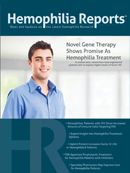Publication
Article
Hemophilia Reports
Which Biologic Therapy Is the Best Choice for Patients With Rheumatoid Arthritis?
The choice of an appropriate disease-modifying antirheumatic drug (DMARD) is complicated by the availability of several agents and the lack of comparative effectiveness studies. Until recently, the scientific consensus did not favor any agent over another as the most appropriate initial biologic DMARD for patients with rheumatoid arthritis (RA).

The choice of an appropriate disease-modifying antirheumatic drug (DMARD) is complicated by the availability of several agents and the lack of comparative effectiveness studies. Until recently, the scientific consensus did not favor any agent over another as the most appropriate initial biologic DMARD for patients with rheumatoid arthritis (RA).1,2
In MayIn May 2013, the Agency for Healthcare Research and Quality (AHRQ) published an update to a comparative effectiveness review for therapies available for RA. In the evidence-based review, AHRQ investigators used data from any trial with at least 100 participants. Investigators also used data from retrospective studies and meta-analyses. Among injectable biologic DMARD therapies, only abatacept and infliximab have been directly compared in a head-to-head trial, with no differences in effectiveness detected.1
Despite the lack of firm comparative conclusions from head-to-head studies, investigators report that biologic DMARDs are more likely than traditional oral therapies to reduce symptoms of RA by American College of Rheumatology (ACR) criteria.1
In assessing tolerability, AHRQ investigators found similar overall tolerability ratings between oral and biologic therapies. Compared with oral DMARDs, short-term adverse events (AEs) were more common with the use of injectable biologic DMARDs.1
Among biologic DMARDs, etanercept may be more tolerable than other biologic therapies because the rate of withdrawal due to AEs was lower with etanercept than with other biologic DMARDs.1,2
A 2014 evidence review by Michaud et al also supports a higher comparative tolerability with etanercept than with other therapies. In the analysis of 44 randomized controlled trials, including data from over 11,000 patients, treatment with TNF inhibitors versus traditional DMARDs was 42% more likely to result in discontinuation of treatment due to AEs. This effect was primarily due to 3 TNF inhibitors: adalimumab, certolizumab pegol, and infliximab. Compared with traditional DMARDs, each of these treatments was associated with higher rates of serious infection and discontinuation due to AEs. However, one TNF inhibitor, etanercept, was associated with a 38% lower risk of discontinuation related to AEs (odds ratio: 0.72; 95% CI: 0.55-0.93).2
In a special issue of The American Journal of Pharmacy Benefits, Chastek et al published a retrospective study comparing 3 TNF inhibitors: adalimumab, etanercept, and infliximab. Using a claims database, investigators compared clinical outcomes after 1 year of use of each medication in 1495 patients initiating treatment with TNF inhibitors for RA. Patients receiving etanercept were the least likely to require dose escalation, and incurred the lowest treatment costs (Figure 1).3
Figure 1. Percentage of dose escalations per year and mean cost of TNF inhibitors
Drug
Percentage of patients requiring
dosage escalation per year
Mean cost per year
Etanercept
1.7%
$21,821
Adalimumab
9.5%
$23,117
Infliximab
50.3%
$23,661
Significance
P <.001, both comparisons
P <.001, both comparisons
Investigators have found some preliminary evidence of differences in the efficacy of various biologic DMARDs, but these differences may not yet be sufficient to prioritize one biologic DMARD over another in a treatment algorithm.1
Lack of equivocal evidence has been an ongoing challenge for rheumatologists. Methotrexate, sulfasalazine, and leflunomide are oral DMARDs for RA that have been available for many years; however, even after direct comparison of products in clinical trials, investigators did not find clinically significant differences between therapies. Consequently, oral DMARDs continue to be selected based on clinical experience.
Although no definite differences in efficacy have been detected, as far as tolerability, meta-analyses are beginning to favor etanercept over other injectable biologic DMARDs, which may lead to shifts in treatment algorithms.1-3
References:
1. Donahue KE, Jonas DE, Hansen RA, et al, for AHRQ Comparative Effectiveness Review Panel. Drug Therapy for Rheumatoid Arthritis in Adults: An Update. Rockville, MD: Agency for Healthcare Research and Quality; 2013.
2. 2. Michaud TL, Rho YH, Shamliyan T, Kuntz KM, Choi HK. The comparative safety of TNF inhibitors in rheumatoid arthritis - a meta-analysis update of 44 randomized controlled trials [published online June 17, 2014]. Am J Med. doi:10.1016/j. amjmed.2014.06.012.
3. 3. Chastek B, Segal S, Bonafede P, et al. Comparative effectiveness of TNF blockers in rheumatoid arthritis patients. Am J Pharm Benefit. 2013;5(suppl):SP14-SP22.





